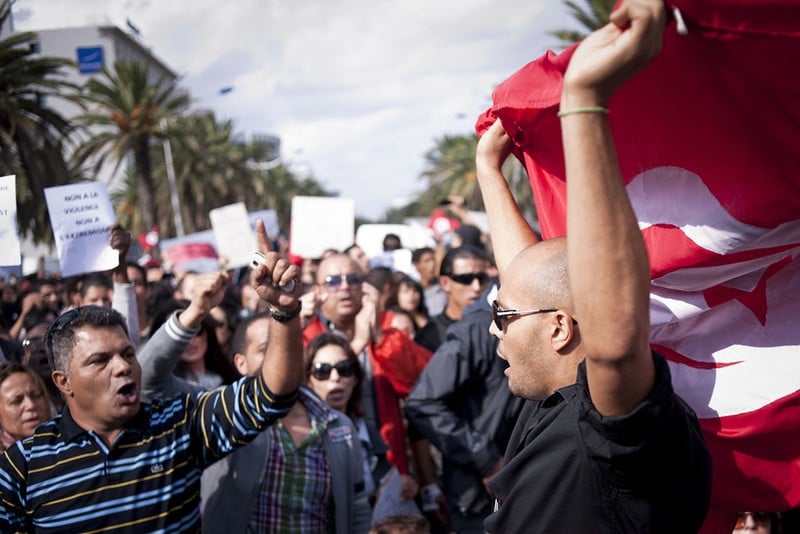On Monday 25 July, Tunisians accepted a new draft constitution, after roughly 92% of voters chose “yes” in the nationwide referendum. However, only approximately 30% of those eligible actually casted a ballot. Opposition groups have boycotted the referendum and accuse President Kais Saied of staging a coup.
The constitutional referendum, put forward by Saied, has faced intense scrutiny nationally, as well as internationally. The reason being that the new draft constitution will forward more power into the hands of the president. This in combination with recent events as Saied took almost full control of the country, to overcome its political and economic deadlocks, makes many afraid that the country will spiral back into its old dictatorial system.
Both sides of the coin
The fact that only 30% of Tunisians voted is critically used by those opposing the president, stating that 70% of all people are against his current rule. However, it should not be forgotten that Tunisia has been in a complete political deadlock for years. Therefore, it might be too short sighted to say that the vast majority is opposed to Saied. Rather, another explanation might be that Tunisians are simply tired of the lack of improvements since the start of de Arab Spring in 2010. In reality, the low turnout is most likely a combination of both sides of the coin, as well as the fact that the referendum fell on a public holiday, resulting in that many Tunisians spent the day away at the beach. The latter of which many say is intentionally used by Saied to accommodate a low turnout in his favor.
What will change exactly?
The new constitution returns Tunisia to a presidential system, replacing its previous balanced parliamentary-presidential structure. This means that the president:
- Can rule by decree until the upcoming December parliamentary elections;
- Has authority over the government and judiciary. The government would therefore have to answer to the president, instead of the other way around. Nonetheless, parliament can still vote non-confidence with a two-thirds majority;
- May draft laws, treaties and state budgets;
- Is allowed to fire and appoint ministers and judges, the latter of whom are not allowed to strike;
- Will be able to serve two five-year terms, which can be prolonged in case of national emergencies;
- Is the head of the armed forces;
An important note is that the constitution still includes the safe keeping of human rights and freedoms. Examples are the rights to free speech, organize in unions and mass gatherings.
What do Tunsians really want?
Even though there is a lot of criticism against Said, the president has still many supporters. They believe that the constitution will simplify the country’s governmental system and therefore reduce the political chaos. In addition, a popular opinion is that this is the only way to tackle corruption and conflict of interests, of which numerous prominent figures have been accused. After the exit polls showed the acceptance of the new draft constitution, many Tunisians celebrated on the streets.
Opposers of the constitution, including political parties and civil society groups think that it will cause Tunisia to fall back into a dictatorial regime. The main reason being the concentration of executive, legislative and judicial power in the hands of one person, which can be easily abused. Saied’s recent firing of judges and prosecution of politicians and journalists adds fuel to this fear.
In the end, Tunisians, regardless of being in favor, against or neutral, wish for political, economic, and social stability in the country.
Reactions
The main opposition alliance in Tunisia has stated that they do not accredit legitimacy to the results. United States State Department Ned Price mentioned that the US is worried about the outcome, due to the constitution not being written in an inclusive manner. President Saied has not yet reacted to his opponents’ statements. However, he did claim that Tunisians will not lose the freedom obtained after the Revolution, over a decade ago.
Most important political events over the last 11 years
January 2011: President Zine El Abidine Ben Ali is overthrown after weeks of protests, following the death of Mohammed Bouaziz. This marks the start of the Arab Spring, soon spreading to other Arab countries.
October 2011: Islamist political party Ennadha wins the majority of seats in Parliament.
December 2013: Ennahdha hands its power over to a technocratic government, following mass protests.
January 2014: A new constitution is approved by Parliament, granting personal freedoms and dividing power between the president and prime minister.
December 2014: Beji Caid Essebsi wins the first free presidential election & Ennahda forms a coalition with the ruling political parties.
December 2017: Start of a national economic crisis.
October 2019: Independent social conservative presidential candidate Kais Saied receives the majority of votes, showing Tunisians’ disapproval of the establishment parties.
July 2021: Saied dismisses government, dissolves parliament and assigns a new prime minister. The majority of political parties, including Ennahdha, labels it a coup.
July 2022: Tunisians vote in a referendum for a new constitution.
Fears and hopes
It is still too early to imply what effect the new constitution will have on Tunisia. Political opposition groups, civil city organization and many individuals fear that this will be the start of a new doctorial area for the country. However, President Saied still has many supporters who hope that he will solve the political and economic deadlocks as well as counter corruption and conflicts of interests.
Aljazeera1, Aljazeera2, Euronews, France24
Picture: Flickr

